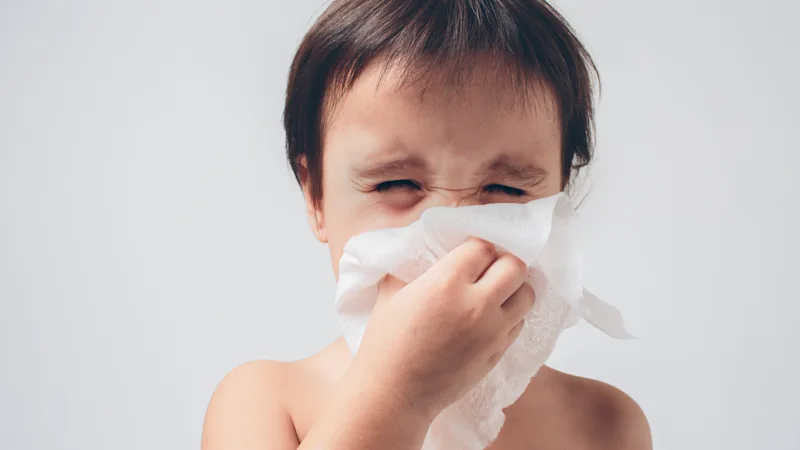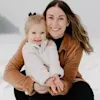Introduction
Emily Greenberg, our Head of Brand and Content at Poppylist, sat down with Dr. Steven Goudy, a pediatric otolaryngologist and founder of Dr. Noze Best, to discuss all things related to babies, RSV (Respiratory Syncytial Virus), and preparations for the upcoming fall and winter seasons. We took their 45 minute webinar session and transcribed it into a digestible, quicker format for our families to access.
Given that most of our audience comprises new parents or those expecting their first child, this discussion couldn't be timelier.
This is Part I of aPart III series where we'll delve into essential topics for new parents, such as RSV prevention and winter wellness tips for babies.
If you'd like to watch the webinar, you can do so here.
Are you a new parent or expecting a baby soon? Then this article is especially for you!
Setting the Stage
Understanding Our Readers: A Quick Poll
Before we get into the nitty-gritty, we conducted a quick poll to understand who our readers are. The majority are new or expecting parents, making this discussion incredibly relevant.
Meet Dr. Stephen Goudy: The Expert Behind Baby Respiratory Health

Dr. Steven Goudy is a highly distinguished pediatric ENT who came to Emory/CHOA after spending 10 years on faculty at Vanderbilt University. Dr. Goudy founded Dr. Noze Best to provide wellness solutions for children and peace of mind for their parents. The company went to market with the NozeBot, a baby nasal aspirator, in January of 2021.
Completing an Emory MBA at GBS was the catalyst that provided the necessary tools and mentors Dr. Goudy needed to launch his cold care company and address the growing baby tech market.
With his brand focusing on infant upper respiratory health and being a father to three kids aged 21, 19, and 14, Dr. Goudy brings both professional and personal insights into parenting.
Key Insights for Baby's First Year: The Importance of Nasal Breathing
Why Nasal Breathing is Crucial for Babies
Did you know that babies primarily breathe through their noses during their first year? Dr. Goudy highlights the importance of maintaining nasal hygiene. Any congestion can impact a baby's essential functions like breathing, eating, and sleeping, affecting the whole family.
"A lot of people don't understand or recognize that babies really breathe primarily through their nose for the first year of life. So when they’re congested, they can’t do much out of their mouth. And so when they get a bad illness, they get congested. They can't breathe. They can't eat, they can't sleep." said Goudy.
Common Illnesses
Babies are prone to getting sick, especially those in daycare. These illnesses often help build their immune system. Most of the time, the issues are viral infections characterized by clear, runny noses. Only about 10% may develop into bacterial infections, which could require medical intervention.
Understanding Infections
Viral vs. Bacterial
Most infections that children encounter in daycare or similar environments are viral. They're generally self-limiting and don't require antibiotics. On the other hand, bacterial infections are less common but might require a visit to the doctor for antibiotics or other treatments.
"I would say that, assuming you've had a good relationship and kind of a debrief with your pediatrician, you know, if your child is six months old and has been in daycare and she or he comes home and has a kinda clear, nasal drainage. In general, that's a viral infection. Viral infections are incredibly common." said Goudy.
What is RSV?

Respiratory Syncytial Virus (RSV) is a common respiratory virus that often leads to mild, cold-like symptoms but can be more serious, particularly in infants and older adults. It's important to note that I'm not a healthcare professional, but common symptoms of RSV typically include:
What are common symptoms of RSV?
More Severe Symptoms (Common in Infants and Young Children)
- High Fever: Above 101°F (38.3°C).
- Severe Cough: That may produce yellow, green, or gray mucus.
- Wheezing: A high-pitched noise when breathing.
- Fast or labored Breathing: Observe for flaring nostrils or straining muscles in the neck.
- Bluish Skin: Particularly around the lips and fingernails, indicating a lack of oxygen.
- Irritability: Especially in infants, they may become more fussy or irritable than usual.
Mild Symptoms (Common in Adults and Older Children)
- Runny Nose: Often one of the first symptoms.
- Cough: Generally a dry cough.
- Sore Throat: Mild irritation or discomfort.
- Mild Headache: Usually not severe.
- Low-grade Fever: Generally below 101°F (38.3°C).
- Fatigue: A general feeling of tiredness.
.png)
Role of the Pediatrician
It's crucial to maintain a good relationship with your pediatric healthcare provider. Different symptoms could mean different things depending on your child's age. For instance, a fever in the first two weeks of life needs different attention than a fever in the first two months or first two years.
"I mean, and I think it having a very good relationship with your pediatric health care provider to your pediatrician, nurse practitioner, or physician assistant, whoever that person is, is important, because they will give you guidelines about how to think about things, right. Obviously, if your baby looks or is acting really sick, then that's a medical emergency." said Goudy.
When to Seek Medical Attention
If you or your child is experiencing symptoms of RSV, especially the more severe symptoms, it's crucial to seek medical attention immediately. Severe RSV can lead to complications like bronchiolitis, an inflammation of the small airways in the lung, and pneumonia, an infection of the lungs. In high-risk cases like infants under 6 months, premature babies, or those with underlying health conditions, early diagnosis and treatment are particularly important.
Note that diagnostic tests, usually involving a sample of mucus, are the only way to confirm RSV.
As always, consult a healthcare provider for accurate diagnosis and appropriate treatment.
Final Thoughts
Dr. Goudy emphasized the importance of early education and awareness, especially for new or expecting parents, to prepare for common issues like RSV and colds in the upcoming season. As he aptly put it, breathing, eating, sleeping, and yes, pooping, are the essentials for a baby's first year. The better prepared you are to manage these, the smoother your parenting journey will be.
Helpful Resources

- Part II: Parent's Guide to RSV and Allergies: Tips from a Pediatric ENT
- Part III:
- Buy the NozeBot by Dr. Noze Best: The NozeBot offers 3 levels of pediatrician-approved suction, to give your baby instant relief from snotty noses.
- Read Blog: What Items to Have in Your Back to School Sick Day Kit
- Read 5 Surprising RSV Facts For Parents
- Follow Dr. Noze Best on Instagram and TikTok
- Buy Baby 411 Book by Pediatrician Dr. Brown and owner of 411 Pediatrics in Austin, Texas
- To watch the complete RSV webinar session with Dr. Steven Goudy, please click here.
Disclaimer: All material on this website is provided for your information and education only and may not be construed as medical advice or instruction. No action or inaction should be taken based solely on the contents of this information; instead, readers should consult appropriate health professionals on any matter relating to their health and well-being. This information isn’t intended to diagnose, treat, cure, or prevent any condition or disease, nor is it medical advice.


